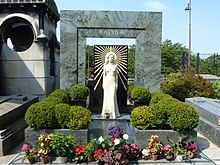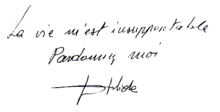Dalida
Dalida , actually Iolanda Cristina Gigliotti (born January 17, 1933 in Cairo , † May 3, 1987 in Paris ), was a French singer and actress of Italian descent. She received international attention with titles such as Bambino (1956), Come prima (1957), Ciao, ciao bambina (1959) , Les Enfants du Pirée (1960), T'aimer follement (1960), Itsi bitsi petit bikini (1960), Le Temps des Fleurs (1968), Darla dirladada (1970) , Paroles ... Paroles ... (1973), Gigi l'amoroso (1974), Il venait d'avoir 18 ans (1974), J'attendrai (1975 ), Besame mucho (1976), Salma Ya Salama (1977), Laissez-moi danser (1979) and Mourir sur scène (1983) and sold around 140 million records worldwide.
life and career
Beginnings
Dalida was born in Cairo in 1933, the second of three children. She spent her childhood and youth in Egypt, where her father Pietro Gigliotti (1904–1945) was the first violinist at the Cairo Opera House, her mother Filomena Giuseppina D'Alba (1904–1971) was a seamstress. Her paternal grandparents Giuseppe and Rosa Gigliotti had emigrated from the province of Catanzaro in Calabria in southern Italy at the turn of the century . Dalida attended a Catholic school. In 1951 she first took part in a beauty contest. Three years later she was voted "Miss Egypt" and played minor supporting roles in the films Joseph et ses frères , The Mask of Toutankhamon and A Glass and a Cigarette . On December 25, 1954, she went to Paris to become an actress. She appeared in two films as a supporting actress.
Dalida's career as a singer began on April 9, 1956 in the Paris Olympia with the French version of Stranger in Paradise ( Etrangère au Paradis ). At this junior competition she was discovered by the head of the house, Bruno Coquatrix , as well as the record producer Eddie Barclay and the program director of the station Europe 1 , Lucien Morisse.
success
Eddie Barclay gave Dalida a record deal with his label Barclay Records . Here Raymond Lefèvre was mostly used as orchestral accompaniment for their recordings . Her debut single was Madonna / Guitare flamenco / Flamenco bleu / Mon cœur va (EP Barclay 70034; released August 28, 1956). The second single followed in December 1956, La violetera / Gitane / Le torrent / Fado (70039). Then on February 8, 1957 came the third single Bambino / Por favor / Aime-moi / Eh! ben ' (70068) on the market. This recording was made with the Lefèvre Orchestra in the label's new recording studio at 9 Rue Hoche in Paris . The record spent a total of 31 weeks as the number one hit in the French charts from April 1957 . On September 19, 1957, Dalida was the first female artist in France - and Barclay Records too - to receive the first gold record for more than 300,000 copies sold by Bambino . In 1958, Dalida was voted “Singer of the Year” and she and the French Yves Montand were awarded the “Music Hall Bravo” .
Dalida received further gold records in 1959 for Ciao Ciao Bambina , Guitare et Tambourin and for On the Day when the Rain came , which reached number 1 on the German charts and was among the ten most successful hits for six months. Dalida was considered the "Queen of the jukebox " in relevant publications . In 1960 alone she made five gold records with Romantica , T'aimer follement , Les enfants du Pirée , Itsi-Bitsi and Milord .
Wedding and separation
On April 18, 1961, the 28-year-old married her discoverer Lucien Morisse in Paris. But the marriage failed a few months later when Dalida moved in with the somewhat younger painter Jean Sobieski .
1961 was another successful year artistically for Dalida. She received a gold record for Last Waltz , Achète-moi un jukebox and Garde moi la dernière danse . In December 1961, she moved into a villa on Montmartre in Paris and separated from Sobieski.
In 1964, Dalida accompanied the Tour de France for the radio station Europe 1 . Every evening she performed on a stage after the race. She drove all over France and sang almost 3,000 songs. In September 1964, Dalida received her first platinum record for more than ten million records sold. In 1967 she was honored in Italy as the most popular singer with the "Oscar Canzonissima".
Private crises
On January 25, 1967, Dalida and her friend, the Italian composer and singer Luigi Tenco , took part in the Sanremo Festival . At the event, first Tenco, then Dalida sang the song Ciao amore, ciao . When the jury decided that both artists were not allowed to take part in the finals, Tenco wrote a suicide note at the Hotel Savoy denouncing the jury's commercial decision and killed himself with a shot in the head.
After Tenco's death, Dalida suffered from mental health problems and depression, and a suicide attempt failed. Dalida overcame the crisis with the help of psychotherapy. The writer Arnaud Desjardins, who had dedicated his life to Far Eastern religions, became her new friend. She accompanied him to India and toured the country alone for three years in the care of a spiritual guide.
Awards and changes in management
In 1968, Dalida received the President's Medal from Charles de Gaulle for her services to French chanson . The Maison des Intellectuels elevated her to Commandeur des Arts, Sciences et Lettres and awarded her the Cross of Honor in gold-plated silver.
After about 15 years of collaboration with the Barclay company, Dalida took over the production of her records herself in 1970 and hired her younger brother Bruno (called Orlando) Gigliotti as producer and manager.
comeback
In November 1971, after a four-year hiatus, Dalida returned to the Olympia in Paris with a new repertoire. Since no one wanted to believe in her comeback, she had to pay the hall rent herself. But their appearance was a huge success.
In 1972 the painter and singer Richard Chanfray Dalida's new life partner. Chanfray was known in Parisian society as the "Count of Saint-Germain". She lived with him on the Mediterranean island of Corsica .
In 1973 she recorded the duet Paroles, paroles (words, words) with the actor Alain Delon . The song became a hit in France, Canada , Japan and many other countries. In 1974 she conquered the top of the charts again with Gigi l'amoroso (Gigi, the lover) and Il venait d'avoir 18 ans (he was just 18 years old). It received the "World Oscar for the Hit Record of the Year" for the second time. She accepted gold records for Le temps des fleurs , Gigi and J'attendrai , and in 1975 she also received a platinum record for Gigi .
In 1981 Dalida separated from Richard Chanfray, and in July 1983 he committed suicide.
More Achievements
With the song J'attendrai she was successful in the disco wave from 1975. Other disco successes were Besame mucho (1976), Laissez-moi danser (1979) and Gigi in Paradisco (1980).
In 1977 Dalida performed for the first time in New York's Carnegie Hall . In the same year she also celebrated her 20th stage anniversary at the Paris Olympia . With Salma Ya Salama , which she sang in Arabic based on the Raï style, she landed another hit. That is why she was also called "Peace Singer from Egypt". A concert tour in Egypt and Lebanon was sold out.
In 1980 Dalida made a guest appearance as a revue star at the Paris Palais des Sports . In the same year, she was presented with the diamond record on the occasion of her 25th anniversary as an artist . The ZDF dedicated her this one by itself moderated special edition of the series of songs Circus subtitled 25 years Dalida . In 1981, a major tour began with the show she performed at the Palais des Sports. In the 1980s, Dalida had other great successes with Mourir sur scène (1983) and Pour te dire je t'aime , the French version of Stevie Wonders I just Called To Say I love You (1984).
For the film The Fighter with Alain Delon , she sang the film title Je n'aime que lui in 1983 .
In 1986 she was celebrated in her native Cairo at the premiere of the film Le sixième jour (The sixth day) by Youssef Chahine (based on a novel by the French-Lebanese writer Andrée Chedid , who was born in Egypt ), in which she played the leading role.
death
On May 3, 1987, Dalida was found dead by a domestic worker in her Parisian house on Montmartre at around 6 p.m. Police said she died of a sleeping pill overdose . The 54-year-old's farewell letter contained only one sentence: “Life is unbearable for me - forgive me.” Dalida was born in the Parisian cemetery of Montmartre , Div. 18, buried.
On April 24, 1997, ten years after her death, Place Dalida , not far from her apartment and her grave, was inaugurated in the 18th arrondissement in her memory .
On the occasion of her 86th birthday, the search engine Google dedicated a doodle to her in 2019 .
Discography
Filmography
- 1955: Le masque de Toutankhamon
- 1955: Sigarah wa kas
- 1958: Rapt au deuxième bureau
- 1959: Girls for the Mambo bar
- 1961: Che femmina… e che dollari!
- 1963: L'inconnue de Hong Kong
- 1963: Teuf-teuf (TV)
- 1965: Menage all'italiana
- 1965: Ni figue ni raisin (TV series, an episode)
- 1966: La morale de l'histoire (TV)
- 1968: Io ti amo
- 1968: American secret service: cronache di ieri e di oggi
- 1986: The sixth day (Al-yawm al-Sadis)
See also
swell
- ↑ Barclay released Dalida EPs, referred to as "Super 45"
- ↑ Bertrand Dicale, Les chansons qui ont tout changé , 2011 o. S .
- ↑ Jens Minor: Dalida: Animated Google Doodle for the French singer & actress' 86th birthday. In: GoogleWatchBlog. January 16, 2019, accessed on January 16, 2019 (German).
Web links
- Website
- Discography and information
- Dalida in the Internet Movie Database (English)
- Literature by and about Dalida in the catalog of the German National Library
| personal data | |
|---|---|
| SURNAME | Dalida |
| ALTERNATIVE NAMES | Gigliotti, Iolanda Christina (maiden name) |
| BRIEF DESCRIPTION | French pop singer and actress |
| DATE OF BIRTH | January 17, 1933 |
| PLACE OF BIRTH | Cairo , Egypt |
| DATE OF DEATH | May 3, 1987 |
| Place of death | Paris , France |





